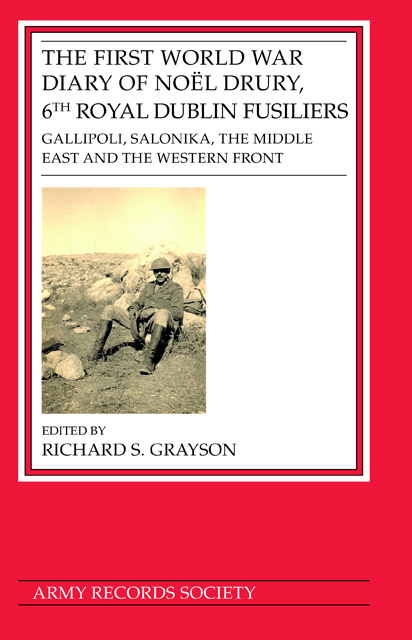 First World War Diary of Noël Drury, 6th Royal Dublin Fusiliers
First World War Diary of Noël Drury, 6th Royal Dublin Fusiliers Published online by Cambridge University Press: 14 June 2023
The landing of the 10th (Irish) Division as part of IX Corps1 commanded by Lieutenant General Frederick Stopford at Suvla Bay was a part of a renewed effort to consolidate and break through on the Gallipoli Peninsula. While Australian, Indian, and New Zealand forces would break out from Anzac Cove, the 10th (Irish) and the 11th (Northern) divisions would secure a winter harbour at Suvla Bay. The 11th (Northern) Division led the landings and were ashore before midnight on 6 August. The 10th (Irish) Division, including Drury's 6th Royal Dublin Fusiliers, followed the next day. The battalion was put ashore around 06.00 on steel barges and faced only light gunfire from Turkish positions. The landing was therefore relatively easy, but there were no orders about what to do once they had established a beachhead, prompting Drury to note ‘we went to Gallipoli without any orders, and without any maps’. At one stage the battalion commanding officer ‘was looking around for someone to give us our orders but no staff were to be seen’. Drury was also critical of the 11th (Northern) Division for not being where he believed they were meant to be, a theme to which he would return during his time at Gallipoli. The next day, the battalion was again without any sense of direction. They were attached temporarily to 33rd Brigade in 11th (Northern) Division and were ordered to make a short move towards Chocolate Hill (taken by the 7th Royal Dublin Fusiliers on the evening of 7 August) but were soon sent back and Drury noted, ‘I cannot understand the delay in moving inland. There has been no fighting all day and the Turks haven't fired a shot and are probably moving up reinforcements and digging new trenches. The men are all talking about the waste of valuable time.’
On 9 August, the 6th Royal Dublin Fusiliers finally got orders to take part in an advance from Hill 50 towards Ali Bey Chesme. This was Drury's first real action and he recalled, ‘The firing was worse than I imagined it would be and I felt very scared’, with snipers hidden in trees a particular problem.
To save this book to your Kindle, first ensure no-reply@cambridge.org is added to your Approved Personal Document E-mail List under your Personal Document Settings on the Manage Your Content and Devices page of your Amazon account. Then enter the ‘name’ part of your Kindle email address below. Find out more about saving to your Kindle.
Note you can select to save to either the @free.kindle.com or @kindle.com variations. ‘@free.kindle.com’ emails are free but can only be saved to your device when it is connected to wi-fi. ‘@kindle.com’ emails can be delivered even when you are not connected to wi-fi, but note that service fees apply.
Find out more about the Kindle Personal Document Service.
To save content items to your account, please confirm that you agree to abide by our usage policies. If this is the first time you use this feature, you will be asked to authorise Cambridge Core to connect with your account. Find out more about saving content to Dropbox.
To save content items to your account, please confirm that you agree to abide by our usage policies. If this is the first time you use this feature, you will be asked to authorise Cambridge Core to connect with your account. Find out more about saving content to Google Drive.